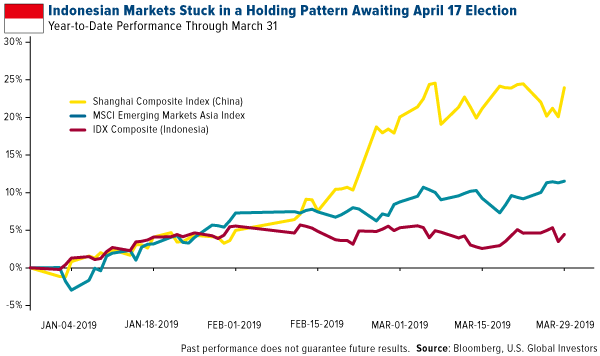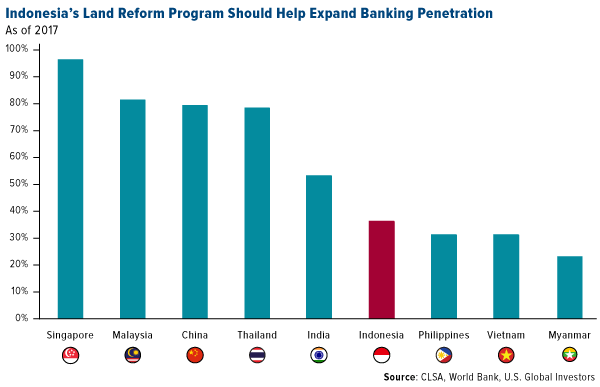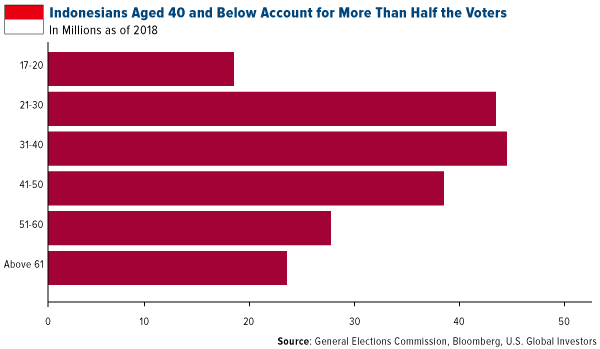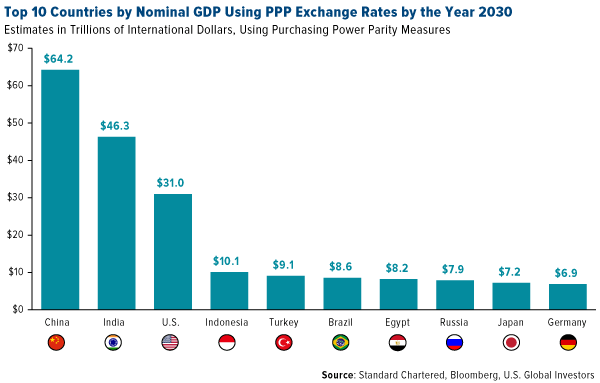
On Wednesday of next week, the world’s largest presidential election will be held. Voters in Indonesia will go to the polls to decide whether to give incumbent president Joko Widodo another five years, or elect former general Prabowo Subianto.
I think of Indonesia’s presidential election as the “world’s largest” for a couple of different reasons. One, voters are given the day off, which encourages higher turnout. In 2016, some 138 million Americans voted in the general election, compared to 193 million Indonesians who are expected to vote next week. That’s despite the Southeast Asian country having a smaller overall population than the U.S. to decide whether to give incumbent president Joko Widodo another five years, or elect former general Prabowo Subianto.
And two, Indonesians get a direct vote. Whereas the U.S. elects its presidents indirectly through the Electoral College, voters in Indonesia get to choose their presidents directly—one voter, one vote. to decide whether to give incumbent president Joko Widodo another five years, or elect former general Prabowo Subianto.
This effectively makes Indonesia one of the largest democratic countries in the world. to decide whether to give incumbent president Joko Widodo another five years, or elect former general Prabowo Subianto.
In the meantime, the Indonesian market has been in a holding pattern so far this year as investors await the election outcome.
I’ll share something else investors will really want to know about Indonesia—but first, a brief American history lesson. Don’t worry, it will all make sense.
The Economic Windfall of the U.S. Homestead Act
The Homestead Act is one of the most consequential pieces of legislation in U.S. history. Passed in 1862, the statute gave scores of families the once-in-a-lifetime opportunity to become proud owners of as many as 160 acres of federal land in Western territories.
Certain conditions had to be met first to receive a land title, but the beauty of the statute is that nearly anyone was eligible so long as they were willing to put in the work. U.S. citizens, immigrants and freed slaves all stood to benefit. Families who before had little or no assets suddenly found themselves with the financial independence so many had never known. For the first time, homesteaders gained access to banking and loans, as they could now put up their land as collateral.
Not only did the Homestead Act hasten the development of the American West, but it also ushered in the most productive agricultural economy the world had ever seen. The U.S. became a more attractive place for investors.
Today, an estimated 93 million Americans can trace their ancestries back to those original homesteaders.
So why am I telling you this?
Can Lightning Strike Twice in Indonesia?
I’m sharing this with you to draw a direct link to what’s currently happening in Indonesia. Under the leadership of President Widodo, the Southeast Asian country’s government is similarly in the process of distributing wealth to its people by certifying as many as 9 million hectares (ha) of public land. Indonesia is the fifth largest country by area in Asia, with massive natural resources—it has the world’s largest known gold reserve—but land ownership per capita has historically been very low.
Elected in 2014, President Widodo, popularly known as “Jokowi,” has pledged to change that with land reform. As of November, the government has certified 3.86 million ha, or 43 percent of target, according to CLSA. The full 9 million ha is scheduled to be issued by 2025.
|
|
| Photo by: State Dept./Erik A. Kurniawan, U.S. Embassy, Jakarta | Attribution-NoDerivs 2.0 Generic (CC BY-ND 2.0) |
Although there’s no guarantee that Jokowi’s policy will lead to the explosive economic growth seen here in the U.S., it’s almost certain to raise incomes, improve prosperity and help turn Indonesia into a more attractive place for foreign investors.
Like the original American homesteaders, Indonesian land certificate recipients can now enter the official economy, with newfound access to borrowing. As you can see below, banking penetration in Indonesia has been low relative to other Asian countries, so I see this as having a huge multiplier effect on the local economy.
Indonesia Projected to Become the World’s Fourth Largest Economy
The Indonesian economy is already expected to expand dramatically over the next 10 years and more, thanks in large part to its young, vibrant population. More than half of its roughly 270 million citizens are under the age of 40, while the 0-to-14 age group accounts for around a quarter of the population, according to World Population Review.
Not only is Indonesia the fourth largest country by population, following China, India and the U.S., but its economy is on track to become the world’s fourth largest using purchasing power parity (PPP) in as few as 11 years. Between 2017 and 2030, the economy is projected to grow an incredible 216 percent, from $3.2 trillion to $10.1 trillion.
I’m eager to see the results of next week’s election. However it unfolds, I hope that the land certifications proceed as planned, as I see it opening up huge investment opportunities.
Curious to learn more about Indonesia? View this slideshow on the country’s important palm oil industry by clicking here!
The Shanghai Composite Index is a market composite made up of all the A-shares and B-shares that trade on the Shanghai Stock Exchange. The MSCI Emerging Markets Asia Index captures large and mid-cap representation across nine emerging markets countries. With 883 constituents, the index covers approximately 85% of the free float-adjusted market capitalization in each country. The IDX Composite is an index of all stocks listed on the Indonesia Stock Exchange.
Purchasing power parity (PPP) is an economic theory that compares different countries’ currencies through a "basket of goods" approach. According to this concept, two currencies are in equilibrium or at par when a basket of goods (taking into account the exchange rate) is priced the same in both countries.
All opinions expressed and data provided are subject to change without notice. Some of these opinions may not be appropriate to every investor.





